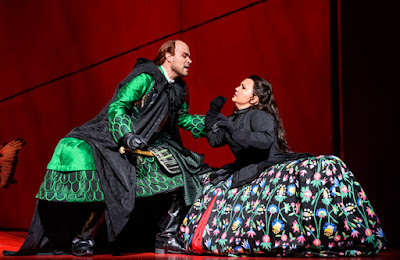James Karas
Rotterdam is a play based
on a simple premise and as you watch it you wonder how the author will be able
to sustain our interest for more than two hours. Jon Brittain does more than
that in this funny, moving, witty and intelligent piece of work.
Alice (Alice McCarthy) and Fiona
(Anna Martine Freeman) are gay, living in Rotterdam and deeply in love. Alice
has not told her parents yet that she is gay but that is not the real problem.
Fiona tells Alice that she is transgender – she is a man in a woman’s body and
she wants to change that. Fiona eloquently explains to Alice that she does not
want to become a man. She wants to stop pretending that she is a woman.
Alice McCarthy and Anna Martine Freeman in Rotterdam/. Photo by Hunter Canning
Josh (Ed Eales-White) is Fiona’s
brother who had a relationship with Alice until she realized that she is gay
and dropped him for Fiona. Alice works with a spirited Dutch girl, Lelami
(Ellie Morris) who is gay and smokes pot. These are the four people who will
deal with the serious issues of the play and make us laugh.
McCarthy does a superb job as
Alice, the shy, apologetic girl who realized at an early age that she preferred
women to men. The only relationships she has had in her life were the failed
one with Josh and the successful one with Fiona. She still cannot bring herself
to telling her parents and how to deal with the desire of Fiona to stop
pretending she is a woman. These themes will dominate the play. The issue is
simple: Alice prefers women. Fiona insists that she is a man.
Freeman’s Fiona is smart,
sympathetic, tolerant and loving towards Alice but she fails to foresee the
consequences of the physical changes she must make to assert he manhood. A
moving portrayal of conflict and despair.
Josh is the sympathetic brother
with a sense of humour and some common sense. He is true foil and sounding board
for the other characters. Morris has to affect what I take to be a Ditch
accent. Lelani is a bit goofy, dresses outlandishly and is very expressive and
uses her hands and the rest of her body when she speaks. Well done.
The set by Ellan Parry consists
of a room indifferently decorated that serves as an apartment, a bar, a waiting
room etc. The scene changes are done by moving pieces of furniture around. Too
much is made of this and I think it could be effected more simply and without
so much fuss. And we don’t need that
many lighting changes. A simple poster can indicate a change of locale, but so be
it.
The real issue with the scene
changes is the loud and really irritating rock music that is played. We hear a
ton of it when we enter the theatre before the performance starts and we are exposed
to it a few thousand times during the performance. Turn the damn noise off.
The simple play with a big issue
and young people experiencing highly stressful situations is not easy to direct
and maintain the pace and the emotional wavelength. Director Donnacadh O’Brian
does excellent work.
An intriguing, stimulating and
superb night at the theatre.
_______
Rotterdam by
Jon Brittain continues until July 15, 2017 at the Arts Theatre, 6-7 Great
Newport Street, London, WC2H 7JB, www.artstheatrewestend.co.uk











